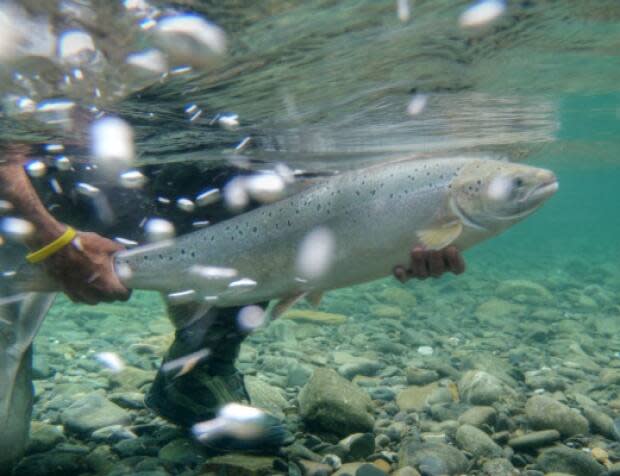In bid to avoid 'total chaos' on Bonaventure River this summer, managers propose new rules

The Bonaventure River — in the Baie-des-Chaleurs, on the Gaspé Peninsula — is renowned for its crystal clear waters, world-class salmon fishing, and perfect canoe and kayak conditions.
But some say the river has become a victim of its own popularity and that the province should impose limits on the number of people using it in order to better protect the ecosystem.
The ZEC de la Rivière Bonaventure — which manages the river's controlled zone for the province — has put forward a water-use plan to the Ministry of Forests, Wildlife and Parks in an effort to reduce the number of people fishing, kayaking, swimming and camping in and around the river.
"There are many aspects to this problem," said Jean-Philippe Tessier, a board member for the ZEC.
Tessier told Quebec AM that although the river's popularity has been steadily increasing since 2014, the COVID-19 pandemic and push for Quebecers to explore the outdoors and their own province made last summer's tourism levels untenable.
"We do not want to live another 2020, this was total chaos," Tessier said, adding there is a certain sense of urgency to get the new rules passed as summer approaches.

The water-use plan would limit the number of boats allowed on the river at a time, change the access terms for the river, and add certain regulations for people swimming or fishing.
Tessier said it's about finding a balance between allowing the public to enjoy the river and finding a way to protect it.
"They're all lovely people, they just all want the same thing: a nice smooth float down the river in peace and nature," he said. "So it's just about organizing everything."
The final decision on the water-use plan is up to the provincial ministry but people are able to vote on whether or not they want a registry of access to the river.
"We have been working for several years, and more intensely since 2016, in co-operation with several stakeholders to ensure the sustainability of the internationally renowned jewel that is the Bonaventure River," wrote Bonaventure Mayor Roch Audet in a statement.
"This plan is in line with the city's guidelines for the preservation of this collective wealth, and the residents will gain from this," he said, adding the ZEC's plan considers both river users and residents.
While nearly a dozen local stakeholders and the mayors of three nearby towns — St-Elzéar, St-Alphonse and Bonaventure — support the plan, not everyone agrees with the track the ZEC is on.
Cime Adventures, a local tourism company that's been in operation for more than 30 years, is decidedly against it.
"What's really preoccupying is we are rushing a decision without basing it on science, and we are compromising the upcoming tourist season," said general manager Élodie Brideau.
Brideau said the ZEC's complaint about hundreds of people using the river at the same time is an "exaggeration," and that she believes regulating the river's use is pushing everyone further from a viable solution.
Cime Adventures, which also offers education about best practices and respect for the environment, welcomed more than 40,000 visitors last year.
Brideau said decreasing the number of people on the river is not viable for the company, and that no one should be faulted for the river's popularity, which she said is "like the Percé Rock of the Baie-des-Chaleurs" and is one of the region's main tourist attractions.
She added she'd like to see scientific studies about the Bonaventure River's ecosystem, instead of relying on anecdotes and observations to make decisions.

 Yahoo Movies
Yahoo Movies 